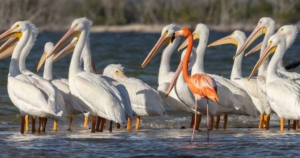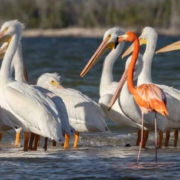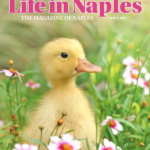Enjoy Birds and Coastal Wildlife at Rookery Bay Research Reserve
 Rookery Bay Research Reserve’s 110,000 acres are a wonderful place for visitors and locals to relax and enjoy Southwest Florida’s coastal beauty and amazing wildlife.
Rookery Bay Research Reserve’s 110,000 acres are a wonderful place for visitors and locals to relax and enjoy Southwest Florida’s coastal beauty and amazing wildlife.
One of the most enjoyable activities at the Reserve is birding and looking at marine wildlife. People come from all over the world to see the multitude of different types of birds that flourish in our subtropical climate and varied habitats, everything from terns and black skimmers on the beaches to wading birds like egrets, herons and roseate spoonbills.
Birders and people interested in observing wildlife are encouraged to get out into the Reserve by boat, on foot or even up close by quiet kayak. Acres of mangrove forests, white sandy islands and warm shallow waters create a perfect environment to witness birds in flight or perched in rookeries dotting island trees as well as see dolphins, manatees and other marine life in their natural habitat.
To protect endangered beach nesting birds during the spring and summer months (including black skimmers, least terns and Wilson’s plovers), Rookery Bay Research Reserve and partners close certain sections of beaches and islands to the public.
Visitors may notice roped off “No Trespassing” areas or “Closed for Boat Landing” signs on islands. This is to protect mating pairs, their tiny eggs and cotton ball-sized chicks from any disturbance; and plays a vital role in the survival and long-term conservation of these endangered birds.
Tips to Protect Birds and Wildlife at Rookery Bay
- Please avoid areas posted for nesting birds.
- Observe birds and wildlife from a safe distance with binoculars. If a large flock of birds fly off all at once, you are probably too close.
- Stash Your Trash – Plastic, glass and fishing line should be retrieved. It can last a lifetime in the natural environment.
- Careful Casting When Fishing Near Wildlife- Birds, fish and other marine life can easily become entangled in fishing line
- Keep dogs on a leash at all times
- Carry In/Carry Out Plastics – Single use plastics such as bags and straws resemble food to many marine animals and birds. They can easily be ingested
- If you see an animal in trouble: Please contact Florida Fish and Wildlife at MyFWC.com for help.
Rookery Bay is here for everyone to experience and explore! Spend some time at the Rookery Bay Environmental Learning Center or take a guided-kayak trip or scenic boat ride.
Learn more at RookeryBay.org.
Rookery Bay Environmental Learning Center 300 Tower Road, Naples, FL 34113
RookeryBay.org Hours: Monday – Saturday, 9 a.m. – 4 p.m.
Guided Kayak and Boat Tours call (239) 530-5972 or visit www.rookerybay.org




Leave a Reply
Want to join the discussion?Feel free to contribute!